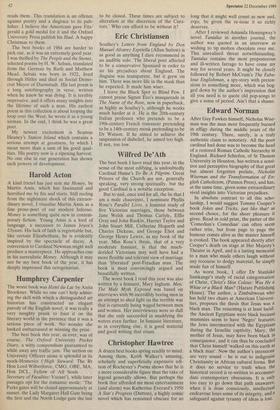Edward Norman
After Guy Fawkes himself, Nicholas Wise- man was the man most frequently burned in effigy during the middle years of the 19th century. There, surely, is a truly authentic claim to notoriety. All the poor cardinal had done was to become the head of a restored Roman Catholic hierarchy in England. Richard Schiefen, of St Thomas University in Houston, has written a sensi- tive and perceptive biography of that great but almost forgotten prelate, Nicholas Wiseman and the Transformation of En- glish Catholicism, (Patmos Press), and has, at the same time, given some extraordinary vivid insights into Victorian prejudices.
In absolute contrast to all this scho- larship, I would suggest Tommy Cooper's book Jokes and Tricks, just like that! as second choice, for the sheer pleasure it gives. Read in cold print, the patter of the `Comedian's Comedian' can often seem rather trite, but from page to page the humour comes alive as the master himself is evoked. The book appeared shortly after Cooper's death on stage at Her Majesty's Theatre in April, and is a lasting memorial to a man who made others laugh without any recourse to dodgy material; he simply made fun of himself.
As worst book, I offer Dr Stanlake Samkange's study of racial categorisation of Christ, Christ's Skin Colour: Was He a White or a Black Man? (Harare Publishing House). The author, a Zimbabwean who has held two chairs at American Universi- ties, proposes the thesis that Jesus was a black man. The reasoning is at least lucid: the Ancient Egyptians were black because mummies seem to have `Negro' features; the Jews intermarried with the Egyptians during the Israelite captivity; Mary, the mother of Jesus, may have been black in consequence, and it can thus be concluded that Christ himself 'walked on this earth as a black man'. Now the author's intentions are very sound — he is out to indigenise Christianity in African cultural forms. But it does no service to truth when the historical record is re-written to accommo- date contemporary obsessions. It is only too easy to go down that path unawares; when it is done consciously, intellectual endeavour loses some of its integrity, and a safeguard against tyranny of ideas is lost.






































































 Previous page
Previous page